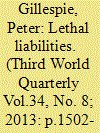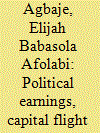| Srl | Item |
| 1 |
ID:
159035


|
|
|
|
|
| Summary/Abstract |
Since 1984, the foreign debt of the Peoples' Republic of China has increased at a greater rate than would be explained by changes in the country's current account, foreign direct investment and reserve holdings. This pattern is consistent with large-scale outflow of financial capital, commonly referred to as capital flight. Since 2005, capital flight has accelerated reaching $425 billion (plus or minus $60 billion) in 2014 alone. This study provides three estimates for capital flight from China for the period 1984 through 2014 using both Cuddington's balance of payments and more inclusive residual measures. These measures are adjusted to reflect the legitimate assets of the Chinese banking industry, mis-invoicing of China's trade with its major trading partners (especially Hong Kong), exchange rate changes, and the failure of official debt data to capture certain bank transactions. Based on these estimates, it is concluded that capital controls have little long-term effect on the volume of capital flight, Hong Kong is increasingly a pipeline for capital flight from the mainland, and that ‘traditional’ explanations do not apply to China's capital flight over the last decade. Finally, corruption, transaction costs, and facilitating migration are considered as possible explanations of the recent acceleration of Chinese capital flight.
|
|
|
|
|
|
|
|
|
|
|
|
|
|
|
|
| 2 |
ID:
158693


|
|
|
|
|
| Summary/Abstract |
The developing world currently loses more money via capital flight than it receives through foreign aid and foreign direct investment combined. This "leakage" of capital produces many pernicious consequences for developing economies. What factors influence capital flight? I argue that it follows an electoral cycle. Greater uncertainty prior to elections incentivizes those in the business sector to take their money elsewhere. Using data from thirty-six African countries from 1971 to 2009, I find support for my argument: capital flight is higher during election years than it is otherwise.
|
|
|
|
|
|
|
|
|
|
|
|
|
|
|
|
| 3 |
ID:
124219


|
|
|
|
|
| Publication |
2013.
|
| Summary/Abstract |
In the mid-1980s I had the opportunity to work with the National Federation of Sugar Workers, the union of sugar plantation workers in the Philippines. It was a desperate period in Negros Occidental, the main sugar-producing island. Sugar prices had fallen worldwide. The end of a preferential trade agreement with the USA had resulted in a dramatic decline of sugar exports to the American market. The economy of Negros had collapsed. Starvation among workers and their families was setting in .
|
|
|
|
|
|
|
|
|
|
|
|
|
|
|
|
| 4 |
ID:
132315


|
|
|
|
|
| Publication |
2014.
|
| Summary/Abstract |
Politicking ranks the most lucrative preoccupation in sub-Sahara Africa generally, and Nigeria specifically. This logically derives from the central role of the state in socioeconomic processes. The public sector, by its size and share of the communal wealth, remains the most potent means of empowering nations for development. Reviewing 12 years of democratic rule in Nigeria, this paper examines the relationship between political earnings, capital flights and economic development with disappointing findings that the economic mix of political earnings constitutes a cog rather than being a catalyst of development in Nigeria. Identifying constitutional, societal and other systemic disincentives as major inhibitive factors, the paper advance measures by which local reinvestment of political earnings could be encouraged to contribute to current efforts at accelerated national development
|
|
|
|
|
|
|
|
|
|
|
|
|
|
|
|